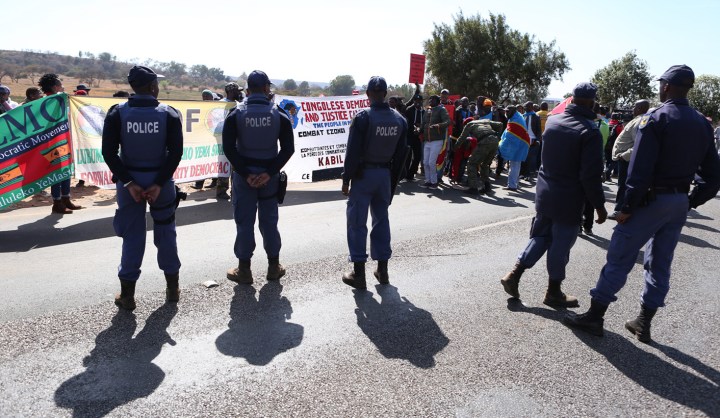Africa
Pro-democracy demonstrators from Zambia, Zimbabwe, Swaziland and DRC protest outside SADC summit

While heads of state of southern African nations gathered at the Department of International Relations and Co-operation (DIRCO) in Pretoria for the 37th edition of the SADC summit, migrants from the African diaspora protested outside against poor and dictatorial leadership in their home countries. By IHSAAN HAFFEJEE.
Demonstrators from Zimbabwe, Zambia, Swaziland and the Democratic Republic of Congo mobilised at the weekend under a coalition called the SADC Democracy Forum and demanded the resignations of the leaders of their various nations.
Protesters indicated that their current leaders behaved more like dictators then democratically elected leaders by suppressing opposition and curtailing media freedoms. Some of those attending the protest in Pretoria told of how they had to flee their home nations because, as critics of their governments, they have been subjected to violence and intimidation.
“Do these people know that Swazis are living under a dictatorship? Do the South African people know that their neighbouring country is run by a dictator?” said a protester who identified himself as Luke. He said he was disappointed that organisations like SADC were doing nothing to assist the people of Swaziland in moving towards a democratic state.
King Mswati III has ruled Swaziland since 1986 as an absolute monarch. Political parties have been banned in Swaziland since 1973 and the government continues to suppress critics and opposition. While protests against King Mswati III continued outside the venue, inside he was handing over the reins of the chairmanship of SADC to President Jacob Zuma, who Mswati referred to as an “astute leader”.
Zambians protested against their current President Edgar Lungu, accusing him of eroding democracy. President Lungu has come under criticism recently after the leader of the opposition, Hakainde Hichilema, was arrested and jailed (he was released last week). Zambians are also still living under a 90-day state of emergency which was instituted by Lungu’s government in July. Under state-of-emergency laws the police can prohibit public meetings, close roads, impose curfews and restrict movements. Before last year’s election the Zambian government shut down The Post, an independent newspaper known for tackling stories on government corruption and mismanagement. Amnesty International called the closure of The Post, “a disturbing development clearly designed to silence critical media voices”.
The arrival of a second group of people who were staging a counter-demonstration in favour of Zambian President Edgar Lungu resulted in clashes, with police trying to keep the groups apart. Those protesting against their governments accused the pro-Lungu group of being sell-outs and told them to leave the area. Police released stun grenades in order to break up some skirmishes and proceeded to escort the pro-Lungu group away from the anti-government protesters.
A large percentage of the demonstrators were made up of a very vocal group from the Democratic Republic of Congo. The Congolese were furious with SADC for recognising Joseph Kabila as a legitimate president. According to the protesters, Kabila, who has ruled the DRC since 2001, lost his legitimacy in December 2016, after his constitutionally mandated term of office ended. Protesters were calling for Kabila to step down and for elections to be held as soon as possible.
Zimbabweans who had joined the protest were calling on the South African government to arrest First Lady Grace Mugabe. Benjamin Ndoro said that he was ashamed of the conduct of the president’s wife, who has been accused of assaulting a 20-year-old South African model with an electrical cord. “Now she wants to get diplomatic immunity for her actions. Why should we be diplomatic with criminals?” said Ndoro. Behind him a group chanted: “Grace is a disgrace,” in reference to Zimbabwe’s first lady, who many say has ambitions of taking over the country’s leadership from her husband Robert Mugabe, who, at 93, appeared to be sleeping in his seat during the SADC summit. DM
Photo: Police keep an eye on protesters outside the Department of International Relations and Co-operation building where the 37th SADC summit was being held at the weekend: Photo: Ihsaan Haffejee

















 Become an Insider
Become an Insider